Who were the important French philosophers?
Look back over the political and social upheaval of the last millennium, and you’ll find brilliant thinkers asking big questions. Sometimes with an answer. Many were from France, so let’s look at the famous French philosophers that left their mark on French culture.
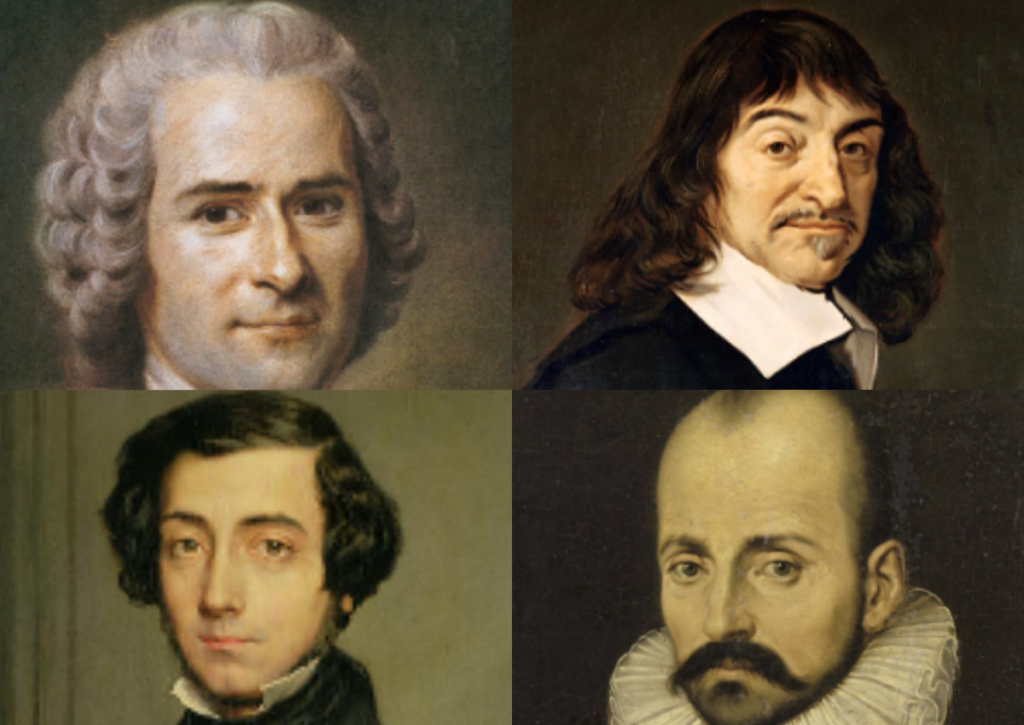
List of the most famous French philosophers
- Michel de Montaigne
- René Descartes
- Voltaire
- Jean-Jacques Rousseau
- Auguste Comte
- Alexis de Tocqueville
- Jean-Paul Sartre
- Simone de Beauvoir
- Michel Foucault
- Gilles Deleuze
Michel de Montaigne (1533 – 1592)

Michel de Montaigne is rarely the first name on a list of famous French philosophers. Unless it’s chronological like this one.
The French noble had an accomplished political career. Appreciation of his writings came later, not least for pioneering essay writing.
His succinctly titled Essais captured his intellectual musings on humanism, riddled with personal references. It encapsulated Renaissance challenges to the old order.
Writers on both sides of the English Channel took inspiration from his approach, establishing a legacy as one of the finest French thinkers of the early modern age.
René Descartes (1596 – 1650)

Cogito, ergo sum. I think, therefore I am. Sounds snappier in Latin, but it’s the saying René Descartes is remembered for. A poetic counter to questions about our existence.
Widely considered the father of modern philosophy, Descartes profoundly influenced rationalism and the Enlightenment.
A mathematician and scientist in his spare time, the legendary French thinker introduced methodological skepticism, subsequently renamed Cartesian thought.
His most influential works, notably Meditations on First Philosophy (1641) and Discourse on Method (1637,) are still pored over by students and curious minds.
Voltaire (1694 – 1778)

François-Marie Arouet, AKA Voltaire, was the preeminent French thinker of the Enlightenment (if you ignore Rousseau, which he frequently did).
Before the French Revolution, Voltaire spoke passionately about ideas that would become revolutionary mantras. It was political dynamite in a period when the king could silence dissent with a slightly furrowed brow.
Voltaire found time to knock out around 2,000 books and pamphlets, including the well-received Candide (try The Portable Voltaire for a condensed collection of his works). Even more remarkably, he dodged the king’s ire and lived to 83.
Not long enough to see revolution sweep his home city, Paris. Fortunate perhaps. His accommodating views on the monarchy were typically rewarded with a once-in-a-lifetime trip to the guillotine.
Jean-Jacques Rousseau (1712 – 1778)
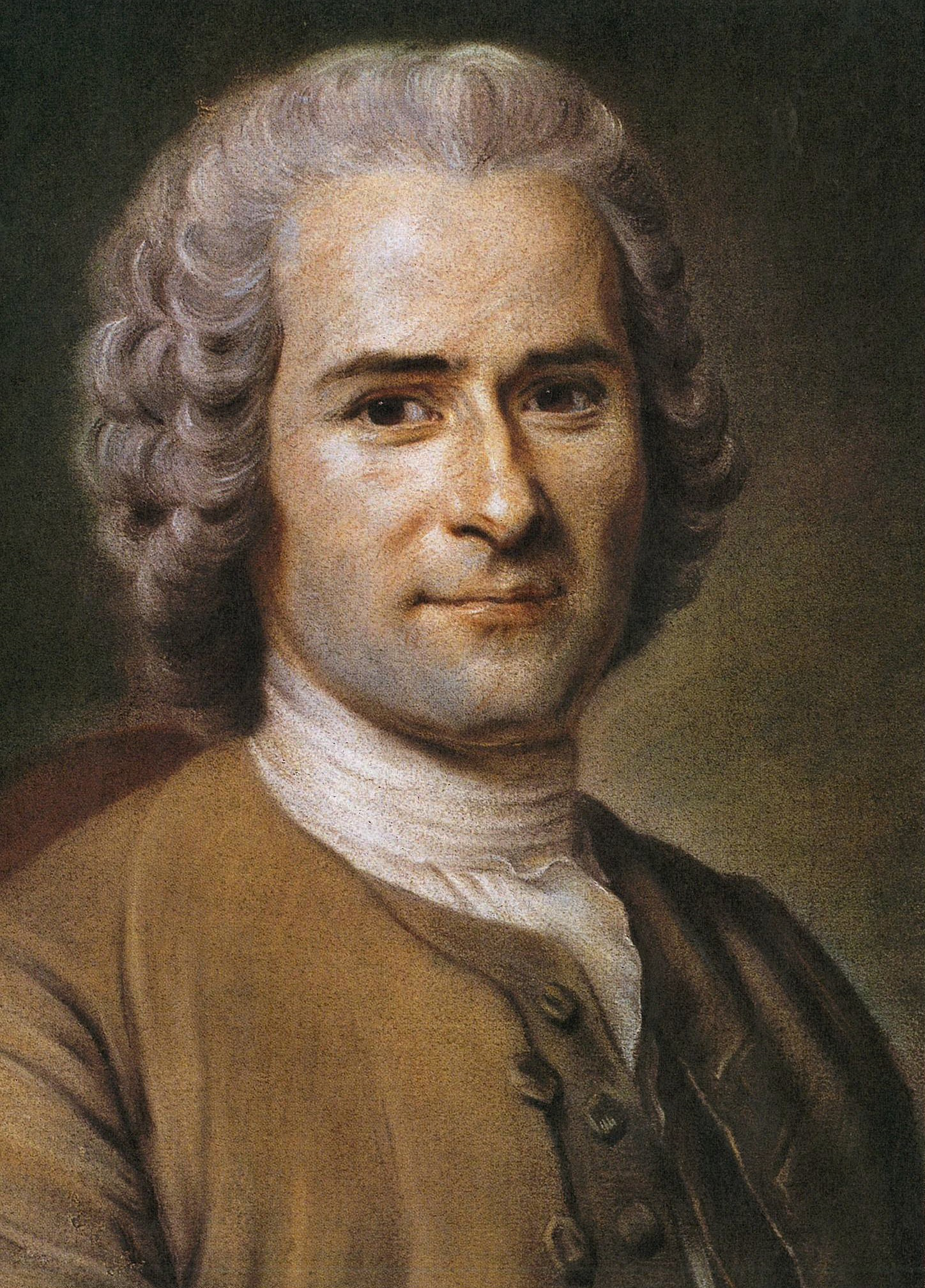
The other great French thinker of the Enlightenment is Jean-Jacques Rousseau. Born in Geneva, he lived a colorful life between France and Switzerland.
Geneva’s “advanced” democracy (rich men could vote) shaped a philosophical outlook rooted in political theory and human development.
His Social Contract (1762) rewrote political science. Advocating for individual sovereignty, he formulated the idea of an unwritten and mutually beneficial contract between the state and the individual.
Other political writings outlined his support for a republic and were later appropriated by revolutionary leaders.
Like his sometime critic Voltaire, Rousseau died in 1778. A decade before his ideas helped shape history.
Auguste Comte (1798 – 1857)

Auguste Comte was born after the French Revolution. And it shows in his great idea, positivism. Promoting the quest for absolute knowledge and solutions to societal problems via science was a natural progression from the Enlightenment.
The school of thought made waves, and other feted philosophers have borrowed from Comte’s writing. Notably his friend John Stuart Mill, in Auguste Comte and Positivism (1865).
Comte’s theories on social evolution and the insistence on scientific proof don’t neatly fit today’s world. Yet they are still debated, underlining why he sits alongside other famous French philosophers.
Alexis de Tocqueville (1805 – 1859)
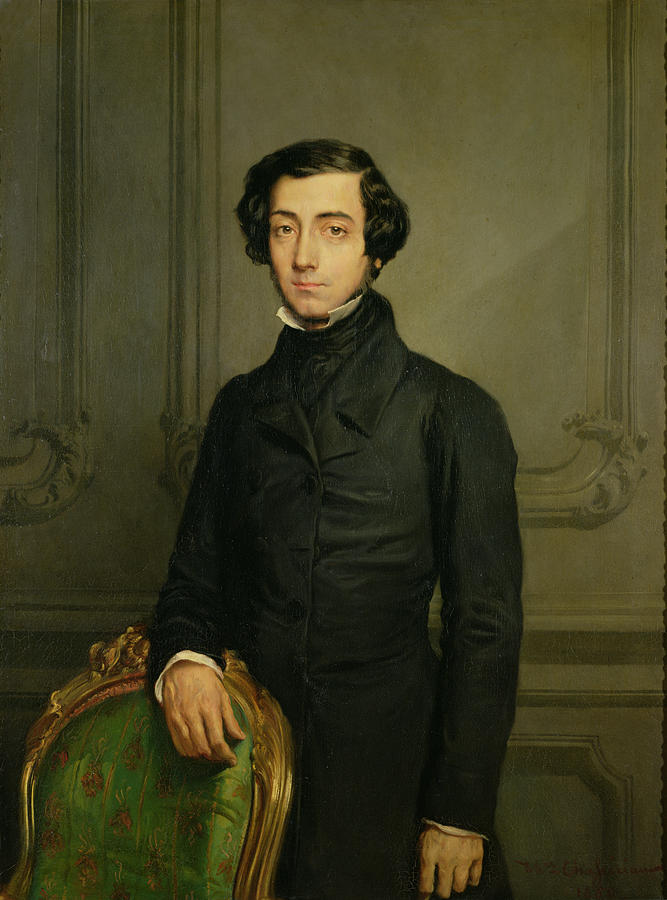
Alexis de Tocqueville found inspiration in the American Revolution and the democratic changes it unleashed.
A Parisian aristocrat yet classic liberal, his most celebrated work is Democracy in America (1835), written after traveling through the States.
He articulated myriad benefits and threats to representative democracy. It quickly became an academic staple, best remembered for the Tocqueville paradox that theorized social friction increases with improved social opportunities.
Later underlining his support for republicanism as a government minister in the short-lived Second Republic, this leading French thinker of the 19th century was a product of his era. And an eloquent defender of liberalism and egalitarianism.
Jean-Paul Sartre (1905 – 1980)
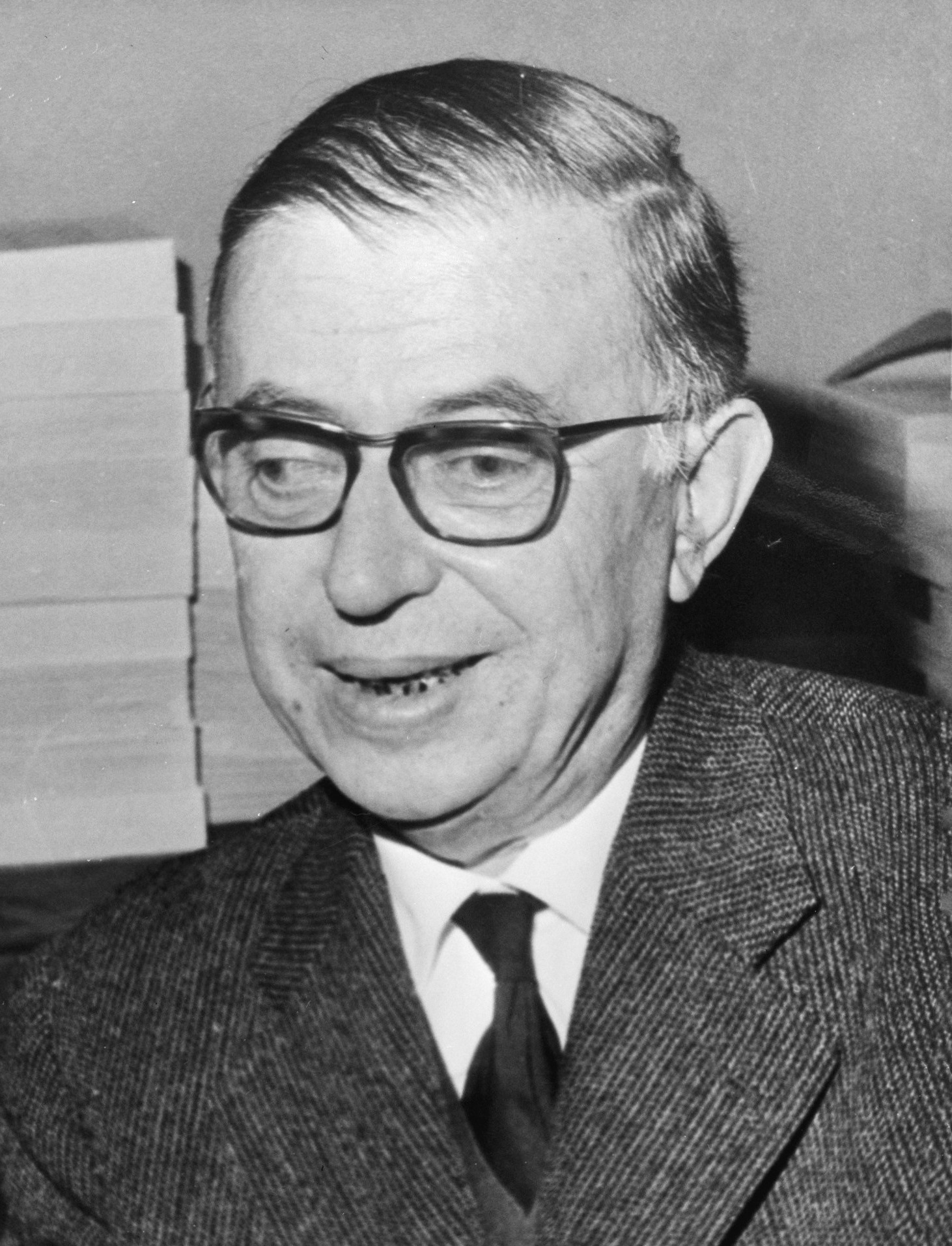
Along with his on-off lover, Simone de Beauvoir, Jean-Paul Sartre was the voice of existentialism and a rock star intellectual of the 20th century.
Often seen holding court in Paris’s Café de Flore, his existentialist masterpiece, Being and Nothingness, established his credentials. As a Marxist, anti-colonialist, and brilliant writer, he influenced sociology and the school of Phenomenology.
Some of his most accessible thinking was found in his novels and plays, including No Exit (1944), containing the immortal line “Hell is other people.”
His writings helped him win the 1964 Nobel Prize for literature, cementing his legacy as one of the most respected French thinkers of recent years.
Simone de Beauvoir (1908 – 1986)
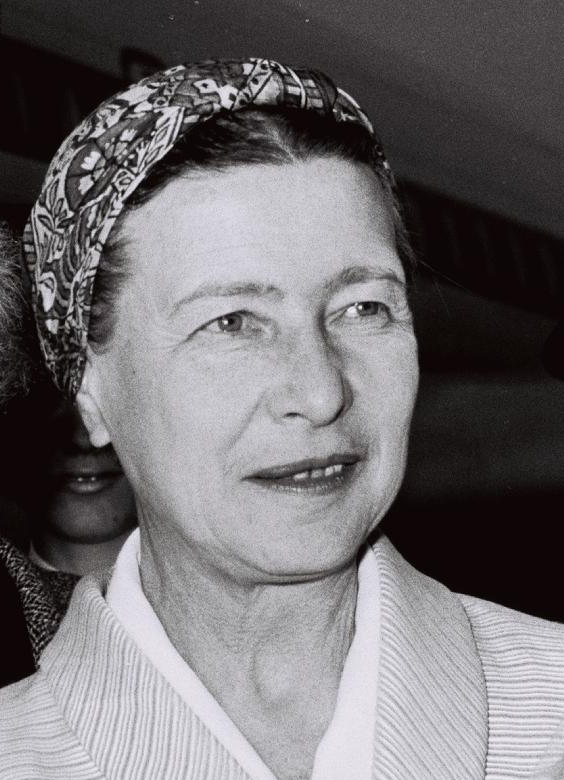
A meeting of minds fueled a complicated relationship between Sartre and Simone de Beauvoir that sparked scandal and admiration. A giant of existentialism, her legacy was also built on championing feminism.
Her seminal work, The Second Sex (1949,) was a game changer. Dissecting past and present roles of women, it didn’t pull punches in talking up women’s rights.
Fiercely open about her free and easy sex life, de Beauvoir is one of the famous French philosophers whose voice still resonates. Not just a celebrated French thinker, but one of the most famous French women of all time.
Michel Foucault (1926 – 1984)
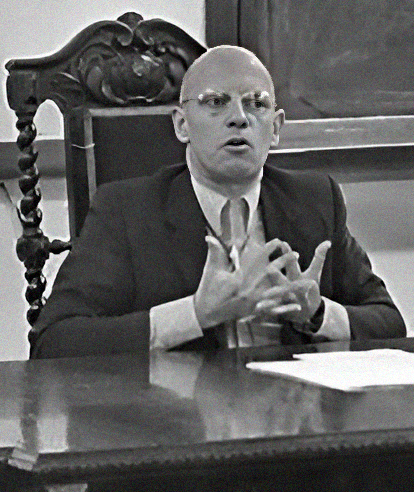
Michel Foucault‘s tangled theories on knowledge as power and its dangerous potential for social control have seeped into many social sciences, from anthropology to criminology.
One of the new wave of French thinkers, his post-modernist writings clinically expose the imbalanced power structures of modern society from many researched perspectives.
For example, his Discipline and Punish: The Birth of the Prison (1975) details how mental torture has replaced physical torture. It can be dense stuff, but he had a razor-sharp take on many political themes swirling today.
Gilles Deleuze (1925 – 1995)
Our list of noted French thinkers wouldn’t be complete without Gilles Deleuze.
Renowned for explaining philosophical schools, he happily proffered his inimitable views on countless themes.
His 1968 masterwork, Difference and Repetition, confuses and enlightens today.
More stirring were his works written with psychoanalyst Félix Guattari — Anti-Oedipus: Capitalism and Schizophrenia (1972) and A Thousand Plateaus (1980). Channeling a belief that free thought died in an age of mass media, he stuck the boot into psychoanalysis and capitalism. A fittingly thought-provoking moment to wrap up our guide to famous French philosophers.



